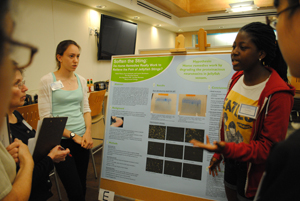Division of Sciences Hosts New York City Partnership to Advance Science (NYCPAS) High School Research Symposium

Brearley High School sophomores Funmi Adejobi (right) and Kaitlin Hanss (left) explain the findings from their study at the New York City Partnership to Advance Science (NYCPAS) High School Symposium.
Ray Romano ’11, who in May earned a B.S. in biology from Marymount Manhattan, is working with Brearley School sophomores Funmi Adejobi and Kaitlin Hanss to study the cellular reaction when vinegar, glass cleaner and meat tenderizer are separately used to treat a jellyfish sting. The research study is one of 14 collaborative research projects presented on June 11 at the New York City Partnership to Advance Science (NYCPAS) High School Symposium hosted on the Marymount Manhattan campus.
The one-day symposium was a culmination of a year-long collaboration among nine New York City high schools with faculty and students from the Division of Sciences of Marymount Manhattan College.
The results of the research projects were presented at the symposium that was organized by Associate Professor of Biology Ann Aguanno Ph.D. “This symposium is giving high school science students an opportunity to learn from our students about scientific research that they would normally not be exposed to,” Aguanno said. “MMC students also have the opportunity to teach and apply what they have learned throughout their college coursework.”
MMC Division of Sciences was included in the Consolidated Appropriations Act of 2010 as the recipient of a grant of $400,000, which helped fund the NYCPAS Program and Symposium. The congressional intention of this award is to invest in academic programs at the College’s Geraldine Ferraro Center for Educational Excellence in Science, Technology, and Math. The center aims to expand student exposure to a broad range of laboratory and clinical experiences by increasing the number of Marymount Manhattan students engaged in faculty-mentored research activities on campus.
The Division of Sciences at MMC provides research opportunities for local high school students and their teachers, while offering MMC students a chance to apply their mentoring skills through participation in NYCPAS. The participating New York City high schools included Marie Curie High School of Nursing and Health Professions (Bronx), Cathedral High School (Manhattan), Midwood High School (Brooklyn), Staten Island Technical High School (Staten Island), Bronx High School of Science (Bronx), Williamsburg Charter High School (Brooklyn), Brearley School (Manhattan), Monsignor Scanlon High School (Bronx) and Stuyvesant High School (Manhattan).
The search for the best home remedy for a jellyfish sting required Romano and his group to perform multi-level tests using samples of sheeps blood. The group first established a standard of lysed (deconstructed) red blood cells and whole red blood cells, by diluting whole sheeps blood and viewing the cells using a microscope, and by deconstructing the cells in a hypotonic solution. The sheeps blood was then exposed to the toxin (jellyfish venom), confirming the protein in the venom lysed the cells. The proteins were then treated with the home remedies, which degraded the protein rendering it inactive.
When the group viewed the samples on the computer screen, Romano’s group noticed intact sheeps red blood cells. The cells were round and reflective of light. “When the blood was mixed with the toxin, the toxin caused the cell to lyse, break open, and spill its components,” Romano said. “When viewed under the microscope, there were no cells visible, and there was a lot of debris from the lysis of the cells. When the toxin was exposed to the home remedies, the ability for the toxin to lyse the cells was decreased, evidenced by the intact cells when viewed under the microscope.”
All three home remedies tested were confirmed as treatments for a jellyfish sting in the results on display at the symposium.
“Interacting with the high school students through the NYCPAS gave me the opportunity to hone my mentoring capabilities,” Romano said. “The excitement that the students had when they received results was contagious. This experience has given me an appreciation for high school teachers, and it showed me the dedication that they have for their students.”
“Ultimately we are looking to establish long-term relationships with local New York City high schools,” Aguanno said. “We hope these relationships will help build the science programs at the high schools by exposing both the students and high school teachers to research methods and cutting-edge instrumentation and equipment used here in the Division of Sciences at MMC. In addition we hope to identify future Marymount Manhattan College science students.”
Click here to view the photo gallery from the event.
Marymount Manhattan College is an urban, independent, liberal arts college. The mission of the College is to educate a socially and economically diverse student body by fostering intellectual achievement and personal growth and by providing opportunities for career development.
Published: June 14, 2011
